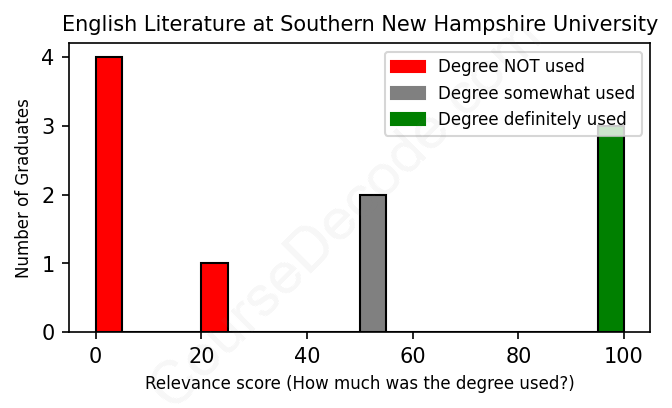
First, some facts. Of the English Literature graduates from Southern New Hampshire University we've analyzed , here's how many have used (or NOT used) their degree in their career:

These are estimates based on AI analysis of 10 LinkedIn profiles (see below).
The verdict? Bad. Overall, with an average relevance score of 42%, English Literature graduates from Southern New Hampshire University have a substantially lower likelihood (-25%) of finding work in this field compared to the average graduate across all fields:
And for comparison, here's the chart for all profiles we've looked at across all degrees.
Also, after graduating, 50% of these graduates have pursued further education other than another Bachelor's degree (such as a Masters degree or other), compared to the average across all profiles of 35%. This suggests you may need more than just a Bachelors degree to be competitive as a English Literature graduate.
See the details:
|
Relevance score: 100% We think this person has gone into a career highly relevant to their degree. We think this person has gone into a career highly relevant to their degree.
DEGREE INFOGraduated in 2014 from Southern New Hampshire University with a Bachelor's degree in English Literature. No other secondary education since. JOB HISTORY SINCE GRADUATIONFreelance Writer Sun Journal - Sun Media Group May 2015 - Present ABOUTNo information provided. |
The top 10 most common jobs done by the graduates we've analyzed (ranked most common to least) are:
Looking through the job history of people who studied English Literature at Southern New Hampshire University, it's pretty clear that a lot of them ended up in teaching roles. Positions like High School English Teacher, Middle School Language Arts Teacher, and various elementary teaching jobs are prominent. These roles often align perfectly with what they learned in school, involving a deep understanding of language, literature, and educational techniques. It's a great fit because they're able to put their knowledge to use every day, inspiring the next generation of readers and writers.
However, it's interesting to note that not everyone stuck to jobs heavily tied to English Literature. Some took on roles that required strong communication skills but didn't really dive into the literary side of things, like client services and administrative positions. And then there are those whose jobs—like cashiering or being a help desk technician—don't really connect to their degree at all. So, while many alumni have capitalized on their English Literature background in teaching or writing roles, there’s definitely a mix, with quite a few venturing into areas that don't directly relate to their studies.
Here is a visual representation of the most common words in job titles for English Literature graduates (this is across all English Literature graduates we've analyzed, not just those who went to Southern New Hampshire University):

When looking at graduates from Southern New Hampshire University's English Literature program, it's clear that many have followed a career path primarily tied to education, especially in teaching roles. For those who graduated in the early 2010s, their first jobs after graduation often revolved around substitute teaching and various positions within elementary and middle schools, leaving a strong mark in the education sector. As they progressed five to ten years down the line, many have made a significant impact teaching English at high school levels, or have transitioned into specialized roles like literacy coaching and curriculum designing. This indicates that a solid number of these alumni have leveraged their degree to build fulfilling careers in education, which aligns well with their area of study.
However, it’s also worth noting that not all graduates have experienced a direct or meaningful connection to their degrees. Some individuals seem to veer off into unrelated fields, taking jobs like help desk technicians or administrative positions, which don’t fully utilize their English literature background. More recently, there are graduates still in entry-level roles, such as pharmacy sales associates, which further points to a mixed bag when it comes to career trajectories. While there are definitely graduates making the most out of their degree in English Literature and thriving in educational positions, others appear to be navigating more tenuous job paths that don't directly relate to their studies.
Honestly, a Bachelor’s in English Literature, like the one at Southern New Hampshire University, tends to be on the easier side compared to some other degrees. It’s not that it doesn’t require hard work—there’s a good amount of reading and writing involved, and you'll dive into a lot of classic and modern texts. But if you enjoy reading and can express your thoughts well, it can feel pretty manageable. The coursework often emphasizes analysis and interpretation, so if you’re passionate about literature and enjoy discussing themes and characters, you'll likely find it engaging rather than overwhelming. Plus, SNHU offers a flexible online option, which makes it easier to fit into your schedule, so overall, it’s definitely a solid choice if you love books!
Most commonly, in the LinkedIn profiles we've looked at, it takes people 2 years to finish a Bachelor degree in English Literature.
Looking at these graduates from Southern New Hampshire University, it seems like they’ve had a mixed bag when it comes to making decent money. Many of them started off in teaching, which can be a real passion-driven job but often doesn’t pay super well, especially for entry-level positions like substitute teaching. Some have moved up to roles that likely offer better pay, such as Literacy Coach or Content Writer, but others are still in lower-paying jobs or freelance gigs which can be inconsistent. Those who transitioned to more stable jobs seem to be doing a bit better financially, but there’s definitely a noticeable gap in earnings potential among their roles. Overall, while there are some promising paths, it looks like money could be tight for several of them, especially early in their careers.
Here is a visual representation of the most common words seen in the "about" section of LinkedIn profiles who have a Bachelor degree in English Literature (this is across all English Literature graduates we've analyzed, not just those who went to Southern New Hampshire University). This may or may not be useful:

Here are all colleges offering a Bachelor degree in English Literature (ordered by the average relevance score of their English Literature graduates, best to worst) where we have analyzed at least 10 of their graduates: